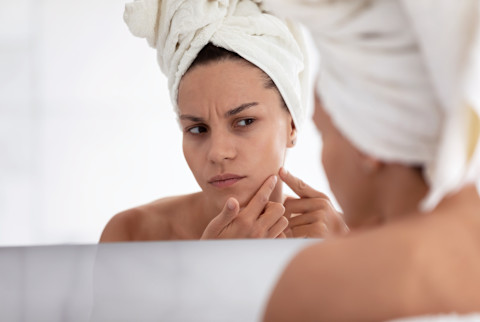So You've Overexfoliated: Don't Panic! 5 Expert Tips To Baby Your Skin Back To Supple

We've all been there: You've gone overboard with a new, glistening scrub or promising tube of retinol, and your skin is quite literally rubbed raw—tight, sensitive, and peeling in scales. Overexfoliation happens to the best of us, and everyone has a different limit—for some, it's trying your hand at an at-home chemical peel; others may face a flare from leaving on a purifying mask mere minutes too long.
It's not a pretty predicament to find yourself in, no matter how you slice it. You're certainly not alone, so we probed experts on how to baby your skin back to its healthy, supple self.
How to know you've overexfoliated
"Overexfoliation, whether chemical or physical, leads to the disruption of the protective barrier of the skin," notes board-certified dermatologist Julie Russak, M.D., FAAD, founder of Russak Dermatology Clinic and Russak+ Aesthetic Center. And when your skin barrier is weakened, it can lead to a host of issues—think dryness, sensitivity, irritation, and itch. If you're facing any of these woes (say, after a few stints with an AHA serum), your skin is likely begging you to drop the regimen.
What to do about it
So it seems you've overexfoliated. Again, it happens, and there's much you can do to get your skin glowing again. The key, here, is to cushion your skin with nourishing formulas and avoid stripping the barrier further:
- Perhaps this goes without saying: Stow the exfoliants! This includes the product in question—perhaps it's a scrub, serum, or mask—but also be mindful of ways you subconsciously exfoliate your skin, like dermaplaning, waxing or shaving, or even drying off with an innocent terry cloth.
- Avoid heat and sun exposure: "Exposing fresh skin that hasn't fully formed a protective barrier can cause discoloration or can sunburn easily," says celebrity esthetician and dermatological nurse Natalie Aguilar. That said, do your best to shield your vulnerable skin from the sun's rays, and slather on a good daily sunscreen. You might also want to avoid hot temperatures (this strips the skin further, which you certainly do not want at the moment), like scalding showers or blow dryers.
- Stick to a no-fuss routine: "One should really keep skin care simple and baby the skin back to a healthy start. After all, baby skin is forming underneath," says Aguilar. Your skin is super sensitive right now, so it's best to use minimal, gentle products free of fragrance and irritants. Aguilar's partial to milk cleansers ("[they] are gentle, don't burn, and won't strip skin of its natural moisture"), like this option from Avéne, as well as moisturizers that focus on barrier repair. Keep the routine nourishing and simple, focusing on pampering ingredients—players like ceramides, hyaluronic acid, and colloidal oat are your friends.
- Don't pick or peel: As your skin heals, it might flake for a bit before revealing new, baby skin underneath. Now, you might feel the urge to peel the dry skin away, but do refrain—trust that those flakes will naturally fall off when they're ready. "Pulling or picking at flakes that aren't ready to come off can leave vulnerable skin raw and prone to scarring and pigmentation," warns Aguilar.
- Make sure your mask doesn't cause irritation: As you may know, your mask can create friction on the skin, which can result in discomfort or irritation for sensitive-skinned folk (that's you for the time being!). While you shouldn't ditch the face-covering altogether, you might want to don a fabric that's sensitive-skin-approved, like 100% cotton. Also be sure to wash your mask with a gentle soap or detergent: "This is a step that might be overlooked, but many detergents have harmful chemicals and fragrances that also further irritate the skin once overexfoliated," says Russak.
As for when you can reach for the scrubs again? Aguilar mentions you can start your routine back up once your skin feels fully healed, which can take anywhere from three to 12 days. If you're at all unsure, best to err on the side of caution and keep up with that sensitive skin routine until you feel undoubtedly ready.
The takeaway
Of course, you should always, always consult a dermatologist if you're in severe pain or discomfort from overexfoliating (say, you face incessant itching, bleeding, or even pustules). But generally, overexfoliation means you're in dire need of some simple barrier repair—give your skin a rest, and replenish it with gentle, pampering formulas.
